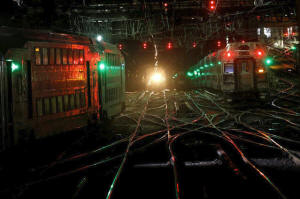|
New York suburban commuters poised for
'summer of hell'
 Send a link to a friend
Send a link to a friend
 [July 07, 2017]
By Barbara Goldberg [July 07, 2017]
By Barbara Goldberg
NEW YORK (Reuters) - New York City's
suburban commuters are bracing for the start next week of what has been
called the "summer of hell" as the United States' busiest train hub
partly shuts down for extensive track repairs.
The work at Pennsylvania Station is due to begin Monday and run through
Sept. 1, leaving the roughly 600,000 commuters who arrive there each
morning from New Jersey and Long Island scrambling for alternate ways
into the city.
Ferry operators, bus services and even parking lots are looking to
capitalize on the disruption, which New York Governor Andrew Cuomo said
will likely mean a "summer of hell" for those who rely on the New Jersey
Transit and Long Island Rail Road (LIRR) systems that will be disrupted
as Amtrak undertakes $40 million in track repairs.
"This is going to be a tough couple of months," said Ronnie Hakim,
interim executive director for the Metropolitan Transportation
Authority, which operates the LIRR, the Metro-North Railroad and New
York City subways and buses.
Hakim advised commuters to travel outside of peak periods if possible,
spread out along platforms to avoid overcrowding and purchase tickets
further ahead of time.

"Consider trying to do things a little differently," she said.
One option that officials are warning commuters against is trying to
drive into the already congested city, even as parking lots near the
midtown transit hub urge riders in billboards and advertisements to do
just that.
"Anyone who works in the city understands the gridlock that
characterizes downtown and midtown Manhattan during business hours. It's
why they chose mass transit to begin with," said New Jersey state
Assemblyman John Wisniewski, who chairs the chamber's transportation
committee.
Wisniewski urged riders to consider ferries and buses as alternatives,
with 97,000 cars per day already crossing from New Jersey to New York
City, according to city data.
The delays will take a toll on the city's economy, with Manhattan
employers expected to lose an estimated $14.5 million for every hour
that train commuters from New Jersey and Long Island are delayed,
according to an estimate by the Partnership for New York City, a
nonprofit business-advocacy group.
[to top of second column] |

Commuter trains travel inside New York's Penn Station, the nation's
busiest train hub, on a section of a complex of tracks that Amtrak
says they will begin repairing over the summer in New York City,
U.S., May 25, 2017. REUTERS/Mike Segar/File Photo

SILVER LINING?
Some regular train riders are trying to find silver linings to the
change in routine. Among them are commuters taking New Jersey
Transit up on its offer to honor some train tickets on ferries that
carry travelers across the Hudson River, a journey that normally
costs $9 each way.
"Riding the ferry is definitely way less stressful than having to
run into a tunnel and hope the train gets you there," Tim Dedman,
43, of West Orange, New Jersey, an information technology manager
who works in lower Manhattan. "The view is great. All these gleaming
towers rising out of the fog."
Others are using the transit trauma to nurture a creative streak.
"Who knew my disgust, Could be expressed artfully? Now get me to
Penn," wrote Joey Neri, an advertising copywriter, in a haiku posted
on the Facebook group NJ Transit Riders Revolt.
Neri, 30, said in an email that he moved to Edison, New Jersey,
because of the direct train service to Penn Station just months
before the repairs were announced. He said he had not written a
haiku since high school but now so regularly posts 17-syllable poems
that he has picked up the nickname "the Bard of Penn Station."
His planned Monday missive? "It is July tenth, The Summer of Hell
begins, Good luck commuters."
(Additional reporting by Riham Alkousaa, Hilary Russ, Laila Kearney
and Gabriella Borter in New York; Editing by Scott Malone and
Jonathan Oatis)
[© 2017 Thomson Reuters. All rights
reserved.]
Copyright 2017 Reuters. All rights reserved. This material may not be published,
broadcast, rewritten or redistributed.
 |